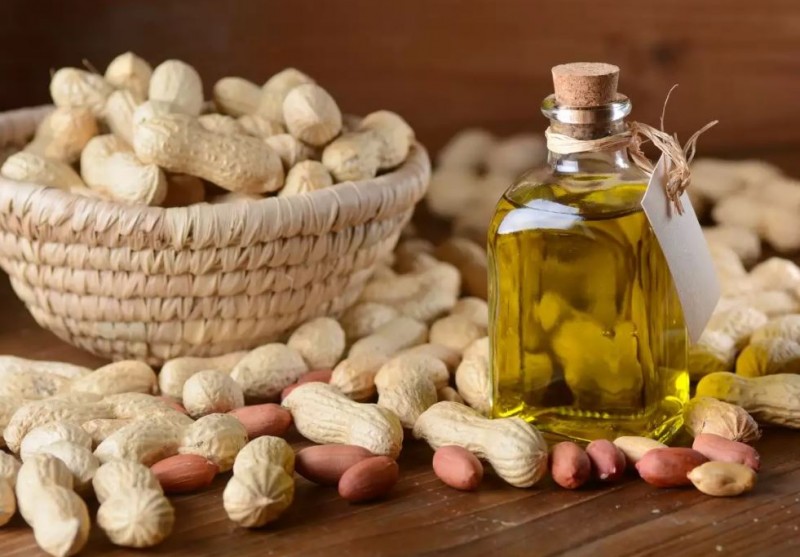
Maintaining a healthy lifestyle and a balanced diet is crucial for overall well-being. When any of these factors becomes irregular, it can pave the way for various diseases. To combat these ailments, people often incorporate a variety of foods into their diets. However, one essential aspect is what you include in your meals. While most households use mustard oil or other cooking oils, did you know that peanut oil can be a healthy alternative? Consuming dishes prepared with peanut oil can contribute to a healthier heart and aid in reducing abdominal fat. Let's explore how peanut oil can be beneficial and help combat various diseases.
1. Heart Health
Peanut oil contains omega-3 and omega-6 fatty acids, which are essential for a healthy heart. These fatty acids can help reduce blood pressure, balance cholesterol levels, and lower the risk of heart disease.
2. Cholesterol Management
Peanut oil contains oleic acid, a healthy fat that can help lower bad cholesterol levels and increase good cholesterol levels, thus promoting better cholesterol management.
3. Diabetes Control
Peanut oil may improve insulin sensitivity, which can be beneficial for controlling diabetes. It helps regulate blood sugar levels, making it a potentially useful option for diabetes management.
4. Cancer Prevention
Peanut oil is rich in antioxidants, which can protect cells from damage. Some studies suggest that peanut oil may reduce the risk of certain types of cancer.
5. Skin and Hair Health
Peanut oil serves as an excellent moisturizer for the skin, helping to keep it hydrated and supple. It can also contribute to healthy, shiny hair.
Incorporating peanut oil into your cooking can have several health benefits, particularly in terms of heart health, cholesterol management, diabetes control, cancer prevention, and skin and hair health. However, it's essential to use it in moderation as part of a balanced diet to reap these advantages.
A Balanced Diet for a Healthy Lifestyle:
In addition to peanut oil, maintaining a balanced diet is crucial for overall health and well-being. A balanced diet should include a variety of nutrients from different food groups to ensure that your body gets the necessary vitamins, minerals, and macronutrients it needs. Here are some key components of a balanced diet:
Fruits and Vegetables: These provide essential vitamins, minerals, and fiber. Aim to incorporate a variety of colorful fruits and vegetables into your daily meals.
Protein: Include lean sources of protein such as poultry, fish, beans, lentils, and tofu in your diet. Protein is essential for muscle repair and growth.
Whole Grains: Opt for whole grains like brown rice, quinoa, whole wheat bread, and oats. They are rich in fiber and provide sustained energy.
Healthy Fats: In addition to peanut oil, incorporate sources of healthy fats such as avocados, nuts, and seeds into your diet. These fats are essential for overall health.
Dairy or Dairy Alternatives: Choose low-fat or dairy-free options for calcium and vitamin D. If you're lactose intolerant, there are various plant-based milk alternatives available.
Hydration: Drink plenty of water throughout the day to stay hydrated. Limit sugary drinks and excessive caffeine intake.
Portion Control: Be mindful of portion sizes to avoid overeating. Eating in moderation is key to maintaining a healthy weight.
Limit Processed Foods: Reduce the consumption of processed and highly refined foods, which are often high in unhealthy fats, sugars, and additives.
Balanced Meals: Try to balance your meals with a combination of carbohydrates, protein, and healthy fats. This helps maintain stable blood sugar levels and provides sustained energy.
Meal Timing: Pay attention to meal timing and avoid skipping meals. Eating at regular intervals can help regulate your metabolism and control hunger.
By following a balanced diet and incorporating peanut oil in moderation, you can work towards achieving and maintaining good health. Remember that it's essential to consult with a healthcare professional or a registered dietitian for personalized dietary recommendations, especially if you have specific health concerns or dietary restrictions.
In conclusion, a healthy lifestyle and a balanced diet play a pivotal role in preventing various diseases and promoting overall well-being. Peanut oil can be a valuable addition to your cooking repertoire, offering benefits for heart health, cholesterol management, diabetes control, cancer prevention, and skin and hair health. However, it should be part of a well-rounded diet that includes a variety of nutrient-rich foods from different food groups. By making informed dietary choices and embracing a balanced approach to nutrition, you can take significant steps towards a healthier and happier life.
How to Remove Blood Impurities Daily with This One Simple Habit
Syria: Funeral held for Victims of Graduation Ceremony Attack at Military Academy
How to Look and Feel Your Best as You Age: Top 10 Skincare Tips for Mature Skin